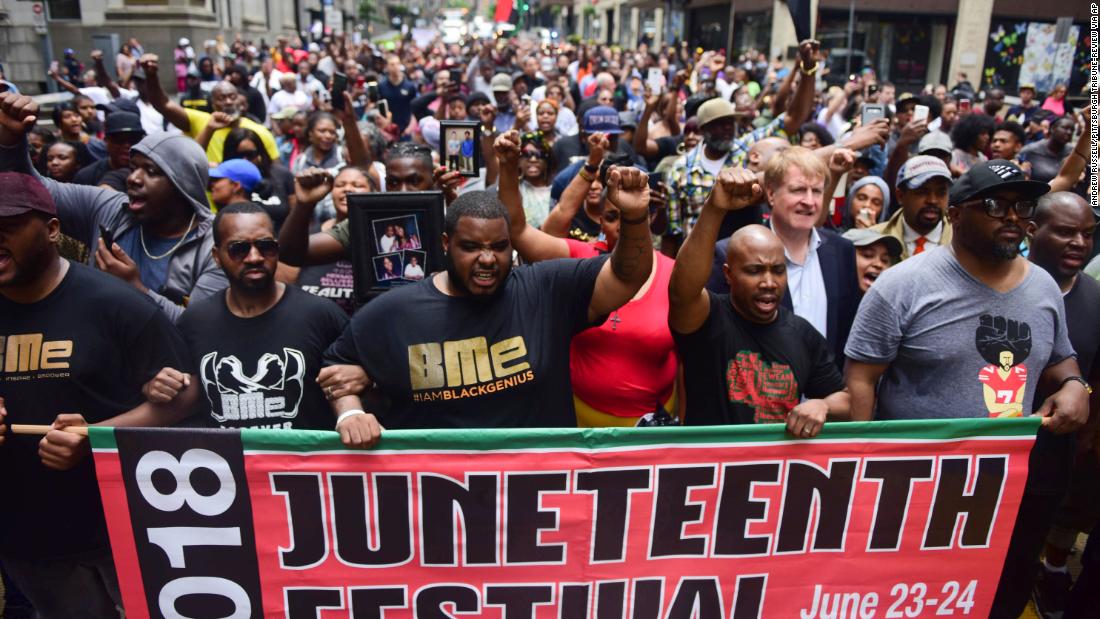(Trends Wide) — The June 19 holiday, Juneteenth or Emancipation Day, commemorates the end of slavery in the United States. However, the country still faces systemic problems of racism and injustice.
Those difficulties were brought to the fore in the 2020 national debate and during the massive Black Lives Matter protests that were sparked by the 2020 killing of George Floyd by Minneapolis police officers.
However, on June 16, 2021, the House of Representatives passed legislation that would establish June 19 as Juneteenth National Independence Day—a combination of the words June and nineteen—a federal holiday. commemorating the end of slavery in the United States.
A day later, Biden signed a bill making Juneteenth a national holiday. Biden said making June 19 a federal holiday would be remembered as “one of the greatest honors” of his presidency.
“I have to tell you that I have only been president for a few months, but I think this will be, for me, one of the greatest honors that I will have as president,” Biden said at the White House during a signing ceremony.
Biden, speaking at the White House alongside Vice President Kamala Harris, echoed sentiments he conveyed when commemorating the Tulsa race massacre in early 2020, that “great nations do not ignore their most painful moments.”
“They hug them. The great nations do not walk away. We have accepted the mistakes we made and by remembering those moments, we begin to heal and become stronger,” said the president.
During the ceremony, the president said that it was not enough to commemorate the holiday, but to use it as a day of reflection and action.
“We have to heal”

94-year-old retired activist and educator Opal Lee, known as Juneteenth Grandma, speaks with US President Joe Biden after he signed the Juneteenth National Independence Day Act in the East Room of the House Blanca on June 17, 2021 in Washington. (Photo by Drew Angerer/Getty Images)
Ninety-year-old civil rights activist Opal Lee organized an annual two-mile walk to demand national recognition of Juneteenth and also honor the rarely told story of some 250,000 enslaved people in Galveston, Texas, who were not they only found out about their freedom two and a half years after the Emancipation Proclamation.
“We have to heal. You have to know what happened and you have to heal from it,” Lee told Trends Wide in a 2021 interview.
Currently, all 50 states and the District of Columbia recognize June 19 as a holiday or observance, but only 18 states have enacted laws as a paid state holiday. These states are: Colorado, Connecticut, Delaware, Georgia, Illinois, Louisiana, Maine, Massachusetts, Maryland, Nebraska, New Jersey, New York, Ohio, Oregon, South Dakota, Texas, Virginia, and Washington state.
Here’s what you need to know about Juneteenth and her story:
- The name of the day is a combination of the words June and nineteen.
- Commemorates June 19, 1865: the day Union Army Major General Gordon Granger rode to Galveston, Texas, and told the slaves of their emancipation. That day came more than two years after President Abraham Lincoln issued the Emancipation Proclamation of 1863. Even after Lincoln declared all enslaved people free on paper, that hadn’t necessarily been the case in practice.
- Juneteenth is also known as Emancipation Day. People across the country celebrate with food and festivities, such as the 4th of July.
- Every state, including the District of Columbia (the city of Washington), recognizes the milestone of black liberation in some way. For example, some companies honor the occasion by giving their employees the day off. The last state to do so was South Dakota.
- Despite having been celebrated since 1865, it was only in 1980 that Texas became the first state to make Juneteenth a state holiday.
- With Biden’s signature, Juneteenth is the first holiday approved since Martin Luther King Jr. Day, which was established in 1983.
- Juneteenth has often been overlooked by non-black Americans and omitted from the history books. However, the impetus to recognize the occasion was generated by the Black Lives Matter movement last year.
- Despite certifying June 19 as a federal holiday, black people in the US continue to face systemic challenges, including the racial wealth gap, disproportionate incarceration, and persistent health disparities. Therefore, activists say the holiday should not be seen as a substitute for substantive action, but as a step in the right direction.
Doug Criss, Ryan Nobles, Ashley Vaughan, Ryan Bergeron, and Veronica Stracqualursi, all for Trends Wide, contributed to this report.





